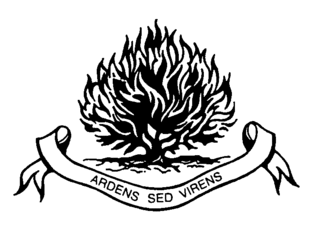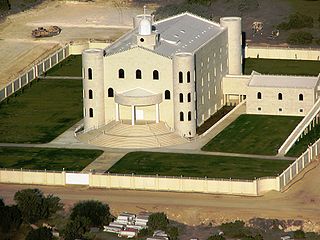
Anglicanism is a Western Christian tradition that has developed from the practices, liturgy, and identity of the Church of England following the English Reformation, in the context of the Protestant Reformation in Europe. It is one of the largest branches of Christianity, with around 110 million adherents worldwide as of 2001.

Christianity is an Abrahamic monotheistic religion based on the life and teachings of Jesus of Nazareth. It is the world's largest religion, with about 2.8 billion followers, representing one-third of the global population. Its adherents, known as Christians, make up a majority of the population in 157 countries and territories, and believe that Jesus is the Son of God, whose coming as the messiah was prophesied in the Hebrew Bible and chronicled in the New Testament.

The Church of Jesus Christ of Latter-day Saints, often informally known as the LDS Church or Mormon Church, is a nontrinitarian church that considers itself to be the restoration of the original church founded by Jesus Christ. The church is headquartered in the United States in Salt Lake City, Utah, and has established congregations and built temples worldwide. According to the church, it has over 16.8 million members and 54,539 full-time volunteer missionaries. The church is the fourth-largest Christian denomination in the United States, with over 6.7 million US members as of 2021. It is the largest denomination in the Latter Day Saint movement founded by Joseph Smith during the early 19th-century period of religious revival known as the Second Great Awakening.

The Church of England is the established Christian church in England and the mother church of the international Anglican Communion. It traces its history to the Christian church recorded as existing in the Roman province of Britain by the 3rd century and to the 6th-century Gregorian mission to Kent led by Augustine of Canterbury.

The Eastern Orthodox Church, also called the Orthodox Church, is the second-largest Christian church, with approximately 220 million baptized members. It operates as a communion of autocephalous congregations, each governed by its bishops and adherents in local synods. The church has no central doctrinal or governmental authority analogous to the head of the Roman Catholic Church—the Pope—but the Ecumenical Patriarch of Constantinople is recognized by them as primus inter pares and regarded as the spiritual leader of many of the eastern Christian parishes. As one of the oldest surviving religious institutions in the world, the Eastern Orthodox Church has played a prominent role in the history and culture of Eastern and Southeastern Europe, the Caucasus, and the Near East. The Eastern Orthodox Church officially calls itself the Orthodox Catholic Church.

Evangelicalism, also called evangelical Christianity or evangelical Protestantism, is a worldwide interdenominational movement within Protestant Christianity that affirms the centrality of being "born again", in which an individual experiences personal conversion, the authority of the Bible as God's revelation to humanity, and in spreading the Christian message. The word evangelical comes from the Greek (euangelion) word for "good news".

Mormons are a religious and cultural group related to Mormonism, the principal branch of the Latter Day Saint movement started by Joseph Smith in upstate New York during the 1820s. After Smith's death in 1844, the movement split into several groups following different leaders; the majority followed Brigham Young, while smaller groups followed Joseph Smith III, Sidney Rigdon, and James Strang. Most of these smaller groups eventually coalesced into the Community of Christ, and the term Mormon typically refers to members of The Church of Jesus Christ of Latter-day Saints, as today this branch is far larger than all the others combined. Since 2018, the LDS Church has requested that its members be referred to as "Latter-day Saints". People who identify as Mormons may also be independently religious, secular and non-practicing, or belong to other denominations.

Methodism, also called the Methodist movement, is a group of historically related denominations of Protestant Christianity whose origins, doctrine and practice derive from the life and teachings of John Wesley. George Whitefield and John's brother Charles Wesley were also significant early leaders in the movement. They were named Methodists for "the methodical way in which they carried out their Christian faith". Methodism originated as a revival movement within the 18th-century Church of England and became a separate denomination after Wesley's death. The movement spread throughout the British Empire, the United States, and beyond because of vigorous missionary work, today claiming approximately 80 million adherents worldwide.

Mormonism is the religious tradition and theology of the Latter Day Saint movement of Restorationist Christianity started by Joseph Smith in Western New York in the 1820s and 1830s. As a label, Mormonism has been applied to various aspects of the Latter Day Saint movement, although there has been a recent push from The Church of Jesus Christ of Latter-day Saints to distance themselves from this label. A historian, Sydney E. Ahlstrom, wrote in 1982, "One cannot even be sure, whether [Mormonism] is a sect, a mystery cult, a new religion, a church, a people, a nation, or an American subculture; indeed, at different times and places it is all of these". However, scholars and theologians within the Latter Day Saint movement, including Smith, have often used "Mormonism" to describe the unique teachings and doctrines of the movement.

The pope, also known as supreme pontiff, Roman pontiff or sovereign pontiff, is the bishop of Rome, head of the worldwide Catholic Church, and also serves as head of state or sovereign of the Vatican City State since the eighth century. From a Catholic viewpoint, the primacy of the bishop of Rome is largely derived from his role as the apostolic successor to Saint Peter, to whom primacy was conferred by Jesus, who gave Peter the Keys of Heaven and the powers of "binding and loosing", naming him as the "rock" upon which the Church would be built. The current pope is Francis, who was elected on 13 March 2013.

Presbyterianism is a part of the Reformed tradition within Protestantism that traces its origin to the Church of Scotland. Presbyterian churches derive their name from the presbyterian form of church government by representative assemblies of elders. Many Reformed churches are organised this way, but the word Presbyterian, when capitalized, is often applied uniquely to churches that trace their roots to the Church of Scotland or to English Dissenter groups that formed during the English Civil War.

The Seventh-day Adventist Church is an Adventist Protestant Christian denomination which is distinguished by its observance of Saturday, the seventh day of the week in Christian (Gregorian) and the Hebrew calendar, as the Sabbath, and its emphasis on the imminent Second Coming (advent) of Jesus Christ. The denomination grew out of the Millerite movement in the United States during the mid-19th century and it was formally established in 1863. Among its co-founders was Ellen G. White, whose extensive writings are still held in high regard by the church. Much of the theology of the Seventh-day Adventist Church corresponds to common evangelical Christian teachings, such as the Trinity and the infallibility of Scripture. Distinctive post-tribulation teachings include the unconscious state of the dead and the doctrine of an investigative judgment. The church places an emphasis on diet and health, including adhering to Kosher food laws, advocating vegetarianism, and its holistic view of human nature—i.e. that the body, soul, and spirit form one inseparable entity. The Church holds the belief that "God created the universe, and in a recent six-day creation made the heavens and the earth, the sea, and all that is in them, and rested on the seventh day". Marriage is defined as a lifelong union between a man and a woman. The second coming of Christ, and resurrection of the dead, are among official beliefs.
The separation of church and state is a philosophic and jurisprudential concept for defining political distance in the relationship between religious organizations and the state. Conceptually, the term refers to the creation of a secular state and to disestablishment, the changing of an existing, formal relationship between the church and the state. Although the concept is older, the exact phrase "separation of church and state" is derived from "wall of separation between church and state", a term coined by Thomas Jefferson. The concept was promoted by Enlightenment philosophers such as John Locke.

The Fundamentalist Church of Jesus Christ of Latter-Day Saints is one of the fundamentalist Mormon denominations whose members practice polygamy. The fundamentalist Mormon movement emerged in the early 20th century, when its founding members were excommunicated from The Church of Jesus Christ of Latter-day Saints, largely because of their refusal to abandon the practice of plural marriage after it was renounced in the "Second Manifesto" (1904). The FLDS Church as a distinct group traces its origins to the 1950s in the Short Creek community, where the group is still based.

The Catholic Church, also known as the Roman Catholic Church, is the largest Christian church, with 1.3 billion baptised Catholics worldwide as of 2019. As the world's oldest and largest continuously functioning international institution, it has played a prominent role in the history and development of Western civilisation. The church consists of 24 particular churches and almost 3,500 dioceses and eparchies around the world. The pope, who is the bishop of Rome, is the chief pastor of the church. The bishopric of Rome, known as the Holy See, is the central governing authority of the church. The administrative body of the Holy See, the Roman Curia, has its principal offices in Vatican City, a small enclave of the Italian city of Rome, of which the pope is head of state.
Scientology is a set of beliefs and practices invented by American author L. Ron Hubbard, and an associated movement. It has been variously defined as a cult, a business, or a new religious movement. The most recent published census data indicate that there were about 25,000 followers in the United States ; around 2,300 followers in England (2011); and about 1,700 in each of Canada (2011) and Australia (2016). Hubbard initially developed a set of ideas that he called Dianetics, which he represented as a form of therapy. This he promoted through various publications, as well as through the Hubbard Dianetic Research Foundation that he established in 1950. The foundation went bankrupt, and Hubbard lost the rights to his book Dianetics in 1952. He then recharacterized the subject as a religion and renamed it Scientology, retaining the terminology, doctrines, and the practice of "auditing". By 1954, he had regained the rights to Dianetics and retained both subjects under the umbrella of the Church of Scientology.

The Episcopal Church, based in the United States with additional dioceses elsewhere, is a member church of the worldwide Anglican Communion. It is a mainline Protestant denomination and is divided into nine provinces. The presiding bishop of the Episcopal Church is Michael Bruce Curry, the first African-American bishop to serve in that position.

Lutheranism is one of the largest branches of Protestantism, identifying with the theology of Martin Luther, a 16th-century German monk and reformer whose efforts to reform the theology and practice of the Roman Catholic Church launched the Protestant Reformation. The reaction of the government and church authorities to the international spread of his writings, beginning with the Ninety-five Theses, divided Western Christianity. During the Reformation, Lutheranism became the state religion of numerous states of northern Europe, especially in northern Germany, Scandinavia and the then Livonian Order. Lutheran clergy became civil servants and the Lutheran churches became part of the state.

Protestantism is a form of Christianity that originated with the 16th-century Reformation, a movement against what its followers perceived to be errors in the Catholic Church. Protestants originating in the Reformation reject the Catholic doctrine of papal supremacy, but disagree among themselves regarding the number of sacraments, the real presence of Christ in the Eucharist, and matters of ecclesiastical polity and apostolic succession. They emphasize the priesthood of all believers; justification by faith alone rather than by faith with good works; the teaching that salvation comes by divine grace or "unmerited favor" only, not as something merited ; and either affirm the Bible as being the sole highest authority or primary authority for Christian doctrine, rather than being on parity with sacred tradition. The five solae of Lutheran and Reformed Christianity summarise basic theological differences in opposition to the Catholic Church.

Saint Peter, also known as Peter the Apostle, Peter the Rock, Simon Peter, Simeon, Simon or Cephas, was one of the Twelve Apostles of Jesus Christ, and one of the first leaders of the early Church. He is traditionally counted as the first bishop of Rome—or pope—and also as the first bishop of Antioch. Based on contemporary historical data, his papacy is estimated to have spanned from AD 30 to his death, which would make him the longest-reigning pope, at anywhere from 34 to 38 years; however, the length of his reign has never been verified.
















